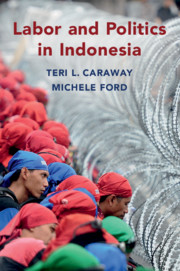Book contents
- Labor and Politics in Indonesia
- Cambridge Studies in Contentious Politics
- Labor and Politics in Indonesia
- Copyright page
- Contents
- Figures
- Tables
- Acknowledgments
- Abbreviations
- 1 Introduction
- 2 The Street and the Ballot Box
- 3 National and Local Policy Struggles, 1998–2008
- 4 Shifting to Offense
- 5 Local Executive Races
- 6 Legislative Contests
- 7 Building a Working-Class Constituency
- 8 Conclusion
- References
- Index
- Cambridge Studies in Contentious Politics
7 - Building a Working-Class Constituency
Published online by Cambridge University Press: 02 March 2020
- Labor and Politics in Indonesia
- Cambridge Studies in Contentious Politics
- Labor and Politics in Indonesia
- Copyright page
- Contents
- Figures
- Tables
- Acknowledgments
- Abbreviations
- 1 Introduction
- 2 The Street and the Ballot Box
- 3 National and Local Policy Struggles, 1998–2008
- 4 Shifting to Offense
- 5 Local Executive Races
- 6 Legislative Contests
- 7 Building a Working-Class Constituency
- 8 Conclusion
- References
- Index
- Cambridge Studies in Contentious Politics
Summary
This chapter explores the question of whether the increased electoral engagement of Indonesia’s unions has fostered the development of a working-class constituency. After explaining the specific challenges of developing such a constituency, we utilize evidence from surveys conducted in working-class communities in four union-dense districts in Bekasi and Tangerang to assess workers’ views on political issues and to analyze their voting behavior in the 2009 and 2014 legislative and presidential races. We find evidence that there is a stable if not growing proportion of workers with politicized collective identities. In legislative races, we argue that these politicized collective identities have not resulted in the formation of a working-class constituency but rather an organizational constituency rooted in the membership of one union, FSPMI. In presidential races, however, we find stronger evidence that union engagement in politics has contributed to the formation of a working-class constituency that crosses organizational divides.
- Type
- Chapter
- Information
- Labor and Politics in Indonesia , pp. 149 - 174Publisher: Cambridge University PressPrint publication year: 2020

